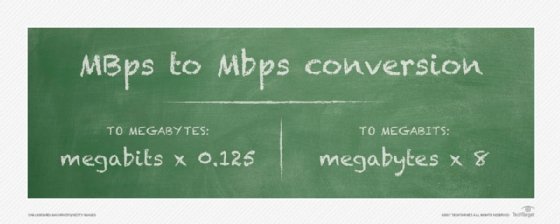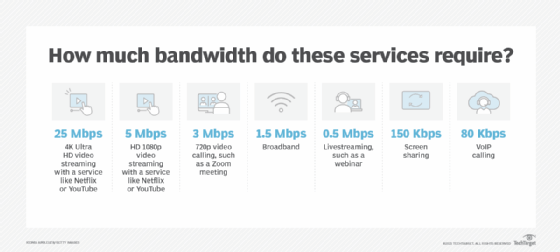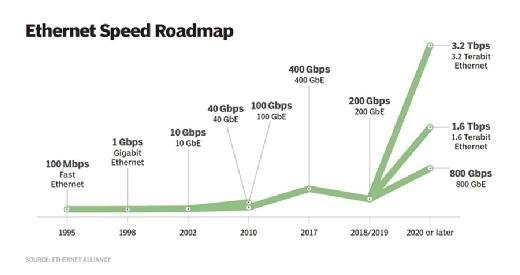Is 44.39 Mbps Download and Upload 589 Mbps Good Speed
What are megabits per second (Mbps)?
Megabits per second (Mbps) are units of measurement for network bandwidth and throughput. They are used to show how fast a network or internet connection is. Each Mbps represents the chapters to transfer 1 meg $.25 each second, or roughly one small photo per second. Information technology may besides be expressed as Mbit/southward or Mb/south.
A chip is the smallest measure of binary information. Each chip is a unmarried 0 or 1. A megabit is 1 million $.25. The measure of Mbps is how many millions of bits a network tin can theoretically transfer each second.
One one thousand thousand bits is not much data in mod terms. It is roughly one minor JPEG picture or 8 seconds of skillful quality music. For a estimator network to have a reasonable speed, it will need to operate at many Mbps.
Megabits per 2nd vs. megabytes per second: What's the divergence?
Megabits per second and megabytes per second (MBps) tin exist hands confused because they look the same, and both show data transfer speed. Megabit is always expressed with a lowercase "b," and megabyte is ever expressed with an uppercase "B."
A byte is viii bits. One megabyte per second is equal to viii megabits per second. To get Mbps from MBps, multiply by eight. To run across MBps, take the Mbps, and carve up by eight or multiply past 0.125. People tin find out roughly how long a large file will take to download if they take its size in megabytes, multiply by 8 then divide by their internet speed in Mbps.

Mbps is commonly used to bear witness the maximum possible speed of a network. Users will typically run into it used for cyberspace speed from an cyberspace service provider (ISP) and network speed for Wi-Fi connections. MBps is typically used to show the bodily transfer speed over a network -- for instance, the download speed of a game or file or when transferring files on a figurer. In that location is no difficult-and-fast rule for what uses Mbps and what uses MBps, though.
The difference between megabits per second and megabytes per second is why yous may run across unlike numbers between your cyberspace speed and actual download speeds. Suppose an cyberspace connection is rated for 100 Mbps. The fastest file download speed is normally virtually 12 MBps. This is considering 100 Mbps divided past viii bits in a byte is 12.5 MBps and, in real-world applications due to overhead, a network will never be able to fully attain its maximum potential.
How many Mbps do I need for net and network?
Internet providers will tell users the maximum speed of the connectedness in megabits per second. This is usually expressed equally 2 numbers with download speed/upload speed. For example, 100 Mbps/20 Mbps -- i.due east., 100 Mbps download and 20 Mbps upload.
In the The states, the Federal Communications Commission defines broadband internet as whatsoever connection faster than 25 Mbps/3 Mbps. This is no longer fast by today'due south standards and should be considered the bare minimum speed for an internet connection.
To decide the best internet speed for their home, consumers should add up the speeds of everything they programme to do at the same fourth dimension in Mbps and purchase an internet plan that will arrange it all. For example, a video streaming platform recommends having 25 Mbps for each 4K video stream, and a video conferencing service recommends 4 Mbps for each briefing. If those in a home needed to lookout man two video streams and exercise a video conference, all at the aforementioned fourth dimension, that would use 25 Mbps + 25 Mbps + 4 Mbps = 54 Mbps of full bandwidth; so, 100 Mbps internet would accommodate that use.

For most home uses, 100 Mbps to 200 Mbps is sufficient. This enables a few people to use the internet at the aforementioned fourth dimension, while leaving some room to grow. If in that location are many people in the dwelling house sharing the same internet or users are doing loftier-bandwidth tasks, like uploading and downloading large files or streaming 4K video, then a faster connectedness is required. Some ISPs offer gigabit cyberspace, which is 1,000 megabits per second, or 1 gigabit per second (Gbps).
Local area network and Wi-Fi speeds are also expressed in Mbps. Always ensure home network speed is greater than internet speed. Most dwelling routers are capable of Gigabit Ethernet. Gigabit Wi-Fi (802.11ac) operates at 500-800 Mbps, while Wi-Fi 6E (802.11ax) may offer speeds up to iii.6 Gbps.

Mbps in video bit rate
Megabits per second are used to limited the bit rate of a video. Video bit rate is not the same every bit the video resolution, merely they are connected. Video resolution is how big a picture is in pixels, and the bit rate is how much data is used to make full the moving-picture show. The higher the resolution, the more bit charge per unit is needed. The college the flake charge per unit, the better the quality.
If two videos utilise the aforementioned resolution simply different flake rates, the video that uses more Mbps volition look meliorate but have upwards more storage. If a video is high resolution but not enough Mbps was allowed, the video quality will non look proficient. The compression codec and processing power may also affect bit rate.
Highly optimized video from a streaming service may use five-ten Mbps for Full HD (FHD). A cellphone may use 16-fifteen Mbps for FHD video. To ensure the all-time quality and enable editing later, a video camera may utilize 30-50 Mbps for the same video. Some high-quality cinema cameras may utilise hundreds of megabits per second.
This was final updated in July 2021
Proceed Reading Well-nigh megabits per second (Mbps)
- How to calculate network bandwidth requirements
- How to summate video conferencing bandwidth requirements
- How to arroyo livestreaming bandwidth management
- Data center functioning requirements spur 25 GbE upgrades
- Kilo, mega, giga, tera, peta, exa, zetta and all that
Dig Deeper on Network Infrastructure
-

serial digital interface (SDI)
-

$.25 per second (bps or scrap/sec)
-

megabytes per second (MBps)
-

gigabit Ethernet phone (gigE phone)
Source: https://www.techtarget.com/searchnetworking/definition/Mbps



0 Response to "Is 44.39 Mbps Download and Upload 589 Mbps Good Speed"
Post a Comment